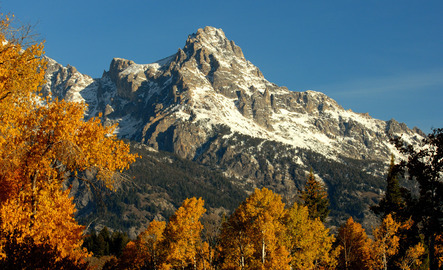About the Environmental Values Minor
The environmental values minor provides a solid foundation in ethics, culture and
policy. The unique, interdisciplinary curriculum teaches students to explore the ethical,
visual, cultural and creative dimensions of environmental issues. It consists of 18
credit hours of courses. This minor is also flexible and designed to work with any
UW bachelor’s degree, so if you’re passionate about the environment — this program
is for you!
Students must be pursuing an undergraduate degree at the University of Wyoming to
declare an environmental values minor.

The environmental values program combines fundamentals of social sciences, natural
sciences and humanities to create a unique, interdisciplinary curriculum. This framework
helps students analyze complex environmental challenges holistically and from many
different perspectives.
Unique courses, including art and ecology, cultures of nature in the United States
and vertical dance, allow students to explore environmental issues through cultural
and artistic lenses. This focus on creativity and culture adds a distinctive dimension
to the program. With an environmental values minor, you'll also get to engage in an
area of concentration that best suits your values, needs and primary program of study.
Concentrations:
- Aesthetics
- Culture
- Ethics
- Policy

What can you do with an environmental values minor?
The environmental values minor is a wonderful addition for anyone looking to make an environmental impact in their career. The knowledge and skills gained can be applied to careers in sustainability, education, conservation, ecology and so much more.
The environmental values minor explores the ethical, cultural and philosophical questions behind environmental issues. Unlike environmental science, which focuses on natural systems, or environmental studies, which emphasizes policy and problem-solving, this minor looks at how human values, beliefs and worldviews shape our relationship with the natural world.
Yes, the environmental values minor can support careers in sustainability, conservation or policy by strengthening your ability to think critically about ethical and cultural aspects of environmental decision-making. It pairs well with majors in science, policy or the humanities and helps you stand out as someone who can navigate complex social and moral dimensions of environmental work.
The environmental values minor builds skills in critical thinking, ethical reasoning and clear communication—foundations that are highly valued in graduate and law school. By exploring how values shape environmental decisions, you’ll be prepared to engage deeply with complex issues in fields like environmental law, public policy, philosophy or sustainability studies.
You'll take a variety of interdisciplinary courses, spanning culture, ethics and policy. Specific course topics include environmental anthropology, global justice, environmental politics and more!


